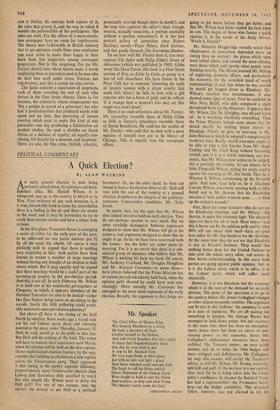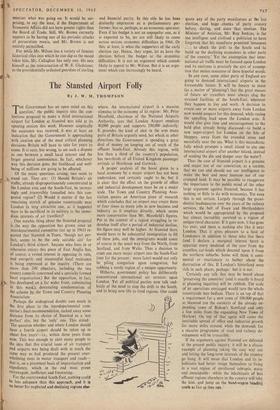POLITICAL COMMENTARY
A Quick Election?
By ALAN WATKINS
A N early general election is now being .,,.seriously talked about, by ministers and back- benchers alike. Mr. Harold Wilson, it is whispered, may go to the country in March or in May. Firm evidence of any such intention is, it is true, remarkably hard to come by; nevertheless there is a feeling in the air and there are straws in the wind; and it may be instructive to try to- catch these elusive straws and have a closer look at them.
In the first place, Transport House is arranging a series of rallies for the early part of the year, to be addressed (as one junior minister put it) by all the usual big wheels. Of course it may perfectly well be argued that there is nothing very surprising in this: both parties have been known to mount a number of large meetings without having any thought of an election in their chaste minds. But it may equally well be argued that these meetings would be a useful part of the warming-up process in the pre-election period. And this is not all. In early February Mr. Wilson is to hold one of his ministerial get-togethers at Chequers, to which, it appears, members of the National Executive are also to be invited—rather like East Enders being taken on an outing to the seaside. Surely this little gathering could profit- ably undertake some pre-election planning?
But above all there is the timing of the Hull North by-election. Some weeks ago a friend took out his red Labour party diary and solemnly Pointed to the space under Thursday, January 13. Hull, he said, would go to the polls on that day. But Hull will do nothing of the kind. The voters will have to contain their impatience until March, when the election will be held on the new register. (Some sophisticated election fanciers, by the way, consider that holding an election on a new register assists the Conservative party. Their argument is that owing to the party's superior efficiency, proportionately more Conservative electors than taboer,,find themselves duly qualified to vote.) Out why should Mr. Wilson want to delay the Hull poll? For one of two reasons, runs the answer. He intends to use Hull as a political
barometer. Or, on the other hand, he does not intend to have a by-election there at all: Hull will vote with the rest of the country at a general election, doubtless to the chagrin of the publicity- conscious Conservative candidate, Mr. Toby Jesse'.
So much, then, for the signs that Mr. Wilson does indeed intend to hold an early election. They do not perhaps amount to very much. But we must carefully distinguish between arguments designed to show that Mr. Wilson will go to the country, and arguments designed to show that he ought to go. So far we have been concerned with the former: but the latter are rather more in- teresting. For it is no secret that there is a sub- stantial group of ministers who believe that Mr. Wilson is pushing his luck too hard. Of course, Mr. Anthony Crosland, Mr. Douglas Houghton and Mr. Richard Crossman—to name three— have always believed that 'the Prime Minister has at various periods mistakenly held back, when the opinion polls showed he could have won con- vincingly. More recently Mr. Crossman has emerged as the most vocal exponent of the early election. Broadly, the argument is that things are going to get worse before they get better, and that Mr. Wilson bad better exploit his luck when he can. The slogan of those who favour a quick election' is, in the words of the Daily Mirror, 'Watch it, Harold!'
Mr. Malcolm Muggeridge recently noted that effectiveness in journalism depended more on timing than on content : the pieces which were most talked about, and caused the most offence, were those which said openly what people were thinking secretly. The Mirror accused Mr. Wilson of neglecting domestic affairs, and particularly the economy, for the tarnished tinsel 'of world statesmanship; it said that unless be was careful he would get bogged down in Rhodesia. Mr. Wilson's reaction was instantaneous. It also showed some signs of panic. First he confided in Miss Nora Beloff, who duly composed a short devotional work for the Observer: it appears that Mr. Wilson, like the Almighty, sees all and hears all: he is watching absolutely everything. Then the Prime Minister leaked some stories that he would shortly be making 'peace moves' in Rhodesia. Finally he gave an interview to Mr. John Beavan in Which he adopted a conspicuously moderate .tone. Really, world statesmen ought to be able to take a few knocks from Mr. Hugh Cudlipp and Mr. Cecil King without becoming rattled; and it is as a world statesman, one pre- sumes, that Mr. Wilson now wishes to be judged; this is precisely the trouble. At one minute he is John Fitzgerald Wilson, pitting his steely resolve against the cunning of Mr. Ian Smith. Then he Winston S. Wilson, summoning up the Dunkirk spirit. And now, God help us, he is Abraham Lincoln Wilson, sonorously quoting both to MiAs Beloff and to Mr. Beavan that his Rhodesian mission is 'with malice towards none ... to bind up the nation's wounds.'
Alas, there arc some ministers who do ruirSee the Rhodesian situation, and Mr. Wilson's 'role therein, in quite this romantic light. The eleetdral signs are there for all to read. Most voters—and this is borne out by the opinion polls and by What MPs tell one about their mail—have no great love either for Mr. Ian Smith or for the Africans. At the same time they do 'not see that Rhodesia is any of Britain's business. They would like nothing better than for the United Nations' Ito take over the whole sorry affair, red armies in blue berets notwithstanding. In this sense both parties are going against public opinion: but, as it is the Labour party which is in office, it is the Labour party which will suffer most electorally.
However, it is not Rhodesia but the economy which is at the root of the demand for an early election. The point of the operation is to go to the country before Mr. James Callaghan's budget or other serious economic troubles. The argument can be put in this fashion : the economy is now in a state of equipoise. We are all waiting for something to happen. Mr. George Brown has managed to hold down prices, but not incomes; at the same time there has been no unemploy- ment; hence there has been an excess of pur- chasing power in the economy; hence 'Mr. Callaghan's deflationary measures have been nullified. The Treasury answer, we may safely assume, will be to make the 1966 budget still more stringent and deflationary. Mr. Callagh,i,, we may also assume, will accept the Treastn.y 's advice, as will Mr. Wilson. Mr. Brown, naturally, will huff and puff. At the moment it is not entirely clear how far he is being taken into the Chan- cellor's confidence. In the past the Board of Trade has had a representative—the Permanent Secre- tary—on the budget committee. This wretched fellow, however, was not allowed to tell his
tl
minister what was going on. It would be sur- prising, to say the least, •if the Department of Economic Affairs did.not have greater rights than the Board of • Trade. Still, Mr. Brown currently appears to be having one of his periodic attacks of persecution mania, and Mr. Brown is not entirely unjustified.
For while.Mr. Wilson has a variety of famous historical roles into which he can slip as the mood takes him, Mr. Callaghan has only one. He sees himself as the reincarnation of W. E. Gladstone; as the providentially ordained guardian of sterling and financial purity. In this role he has been distinctly impressive as a parliamentary per- former; less so, perhaps, as an economic operator. Even if his budget is not an unpopular one, as it is expected to be, we are still likely to come across serious economic difficulties in 1966. Or this, at least, is what the supporters of the early election say. Hence, they argue, let us have the election before the budget or the economic difficulties. It is not an argument which sounds likely to appeal to Mr. Wilson. But it is an argu- ment which can increasingly be heard.







































 Previous page
Previous page